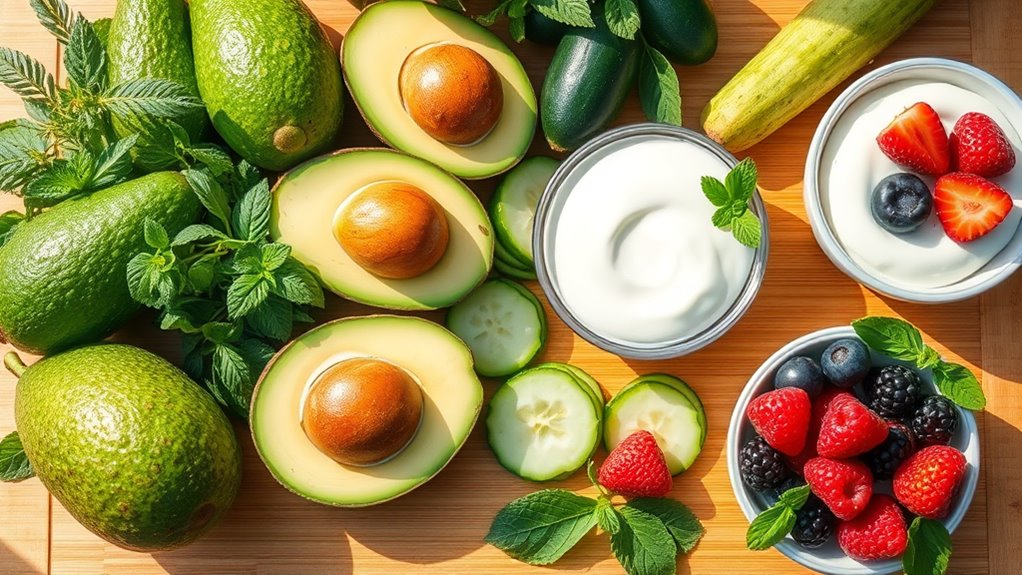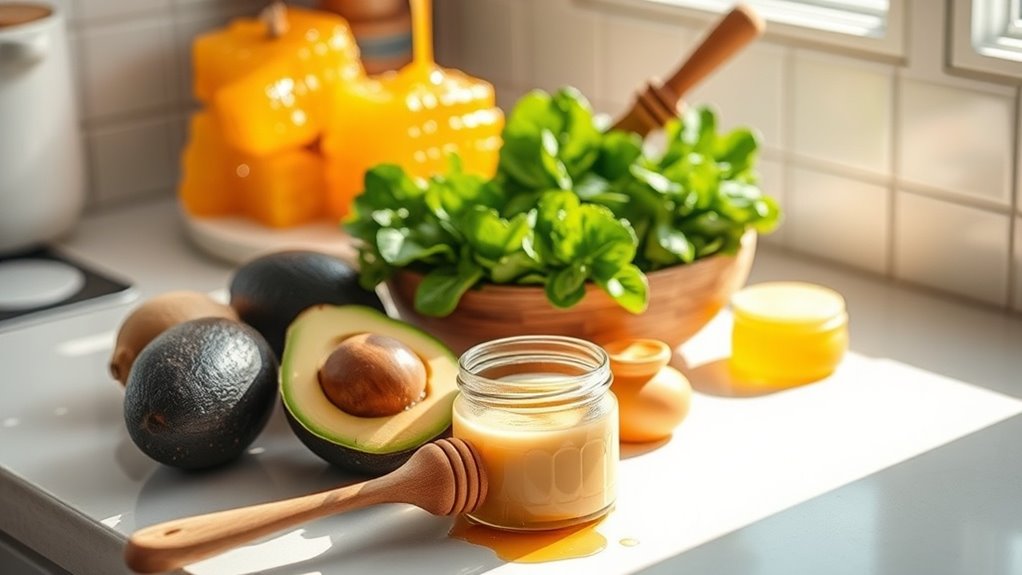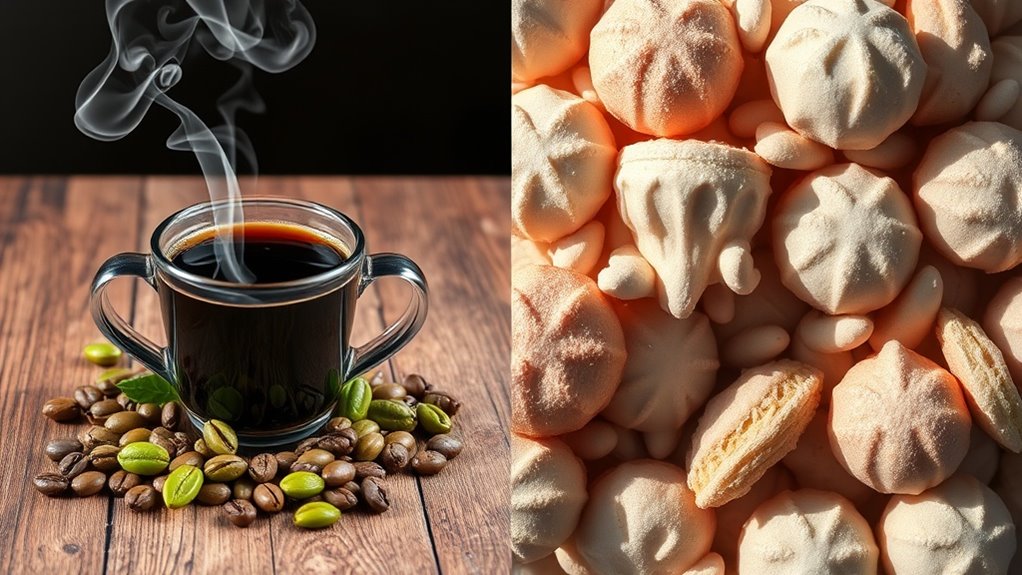Foods That Naturally Reduce Bloating-Backed by Nutritionists
Bloating can feel uncomfortable and frustrating, yet some foods offer practical relief. While many attempts to alleviate bloating involve supplements or medications, nutritionists emphasize the efficacy of certain natural foods. Incorporating options like ginger and yogurt into your diet might not only ease discomfort but also support your overall digestive health. Curious about how these simple choices can make a significant difference in your wellness?
Ginger: A Soothing Digestive Aid
Ginger is one of the most effective natural remedies for alleviating bloating and discomfort in your digestive system. Its anti-inflammatory properties help stimulate digestion, reducing gas buildup.
You can enjoy ginger tea or add fresh ginger to meals for noticeable relief. Incorporating this powerful root into your diet not only helps with bloating but enhances your overall digestive health, making it a go-to among bloating remedies. Moreover, studies have shown that ginger tea can significantly improve digestive health by promoting regular bowel movements and reducing inflammation.
Peppermint: Natural Muscle Relaxant
Peppermint’s natural muscle relaxation properties can significantly help relieve bloating and digestive discomfort.
You can enjoy it in various forms, from tea to essential oil, each offering soothing benefits.
Incorporating peppermint into your routine might just be the key to a more comfortable digestion.
Muscle Relaxation Benefits
While you mightn’t think of peppermint as just a flavorful addition to your tea, this herb has remarkable muscle relaxation benefits, particularly in alleviating bloating discomfort.
Peppermint oil contains menthol, which relaxes gastrointestinal muscles, helping to relieve tension and cramping caused by gas buildup.
Consumption Methods
Incorporating peppermint into your diet can be straightforward and enjoyable.
You can sip peppermint tea after meals to soothe your digestive system. Adding fresh peppermint leaves to salads or smoothies enhances flavor while aiding digestion.
Alternatively, try peppermint oil in a diffuser to promote relaxation. Just remember to consult with a healthcare professional before using essential oils to ensure safety and effectiveness.
Pineapple: Bromelain for Better Digestion
Pineapple is more than just a tasty tropical fruit; it contains bromelain, an enzyme known for its digestive benefits.
By incorporating fresh pineapple into your diet, you can help reduce bloating and improve overall digestion. Alongside pineapple, there are other anti-bloating foods you might want to consider for a more comfortable gut. Including natural foods that promote digestive health can further enhance your experience in alleviating discomfort.
Bromelain’s Digestive Benefits
Bromelain, a potent enzyme found in pineapples, offers impressive digestive benefits that can help reduce bloating.
This enzyme aids in breaking down proteins, enhancing nutrient absorption, and promoting a smoother digestive process.
Studies indicate that bromelain can alleviate discomfort caused by gastrointestinal issues, making it a practical choice for those looking to improve their digestion and minimize bloating naturally.
Pineapple Consumption Tips
When you want to leverage the digestive benefits of bromelain, enjoying fresh pineapple is key. Eating it raw retains more enzymes. Aim for ripe fruit for optimal flavor and benefits. You can also blend pineapple into smoothies or salads.
| Tips | Benefits |
|---|---|
| Eat raw | Maximizes bromelain content |
| Choose ripe | Enhances flavor and digestion |
| Blend in meals | Adds nutrition and taste |
| Pair with yogurt | Supports gut health |
Other Anti-Bloating Foods
If you’re looking to ease bloating and improve digestion, incorporating a variety of anti-bloating foods into your diet can make a significant difference.
Try adding ginger, which reduces inflammation, and yogurt, packed with probiotics. Additionally, consider avocados for their healthy fats and high fiber content, or leafy greens to promote digestion.
These foods can help create a balanced, bloat-free diet.
Cucumbers: Hydrating and Low in Sodium
Many people struggle with bloating, but incorporating cucumbers into your diet can be a refreshing and effective solution.
These hydrating vegetables are composed of about 95% water, helping to flush out excess sodium and reduce bloating.
Plus, their low sodium content makes them ideal for keeping your body balanced.
Slice them into salads or enjoy them as crunchy snacks for optimal benefits.
Bananas: Potassium Powerhouse
Bananas are a nutritional powerhouse that can significantly aid in reducing bloating.
Their high potassium content helps balance sodium levels, which can alleviate water retention.
Enjoying bananas can be easy with these ideas:
- Slice them into your morning oatmeal.
- Blend them into a smoothie for extra creaminess.
- Pair them with nuts for a satisfying snack.
Incorporating bananas into your diet can promote digestive comfort.
Yogurt: Probiotics for Gut Health
In addition to bananas, yogurt is another fantastic food that can help reduce bloating, thanks to its rich probiotic content. Probiotics support a balanced gut microbiome, which is crucial for digestion. By incorporating yogurt into your diet, you may experience less bloating and improved gut health. Additionally, immune-boosting foods can further support your overall wellness. Here’s a quick comparison of yogurt types and their benefits:
| Type of Yogurt | Benefits |
|---|---|
| Greek Yogurt | High in protein |
| Regular Yogurt | Creamy texture |
| Plant-Based | Dairy-free option |
| Low-Fat | Fewer calories |
| Kefir | Fermented drink |




